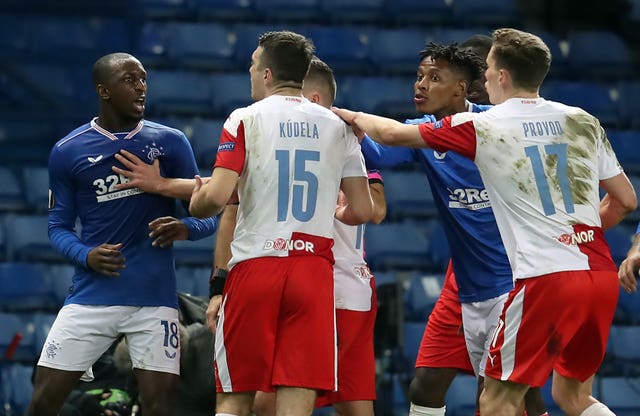Players should be immediately sanctioned if they cover their mouth while talking to an opponent or the referee, Clarence Seedorf has said.
Slavia Prague defender Ondrej Kudela covered his mouth when he allegedly racially abused Rangers opponent Glen Kamara during a Europa League tie last month.
Kudela denies racially abusing Kamara but has served a one-match UEFA ban after effectively admitting a lesser charge of insulting the Finn, with the suspension issued “without prejudice” to any ruling the body might make on the racism allegations.

Seedorf, a former Holland international and four-time Champions League winner, told a Council of Europe meeting on combatting hate speech that stopping players covering their mouths was a simple step which could be taken.
“There is a lot of talk but not enough being done. The need is obvious and very urgent,” he said.
“From a players’ perspective, I have seen stuff with players speaking and covering their mouth during matches. There were some racist situations in the last weeks or months where the players among themselves had hate speeches.
“Those things can be very easily attacked by implementing some rules. For me it should be abandoned to be able to speak like that when you approach an adversary.
“When we’re talking about sport it has to be completely transparent, so why would I cover my mouth if I need to talk with my adversary?”
Seedorf added: “If I want to (cover my mouth to) talk to my coach or a team-mate, all fine, but when I approach the referee or another player in any sport, you are not allowed to cover your mouth, it has to be a sanction, a yellow card.”
Seedorf also believes football’s leadership needs to be more reflective of society if it wants to tackle discrimination.
“I would like to see a reflection of what we’re fighting within those institutions (UEFA and FIFA),” he said.
“There is no equality, there is no inclusion whatsoever in the main organisations themselves. That’s where we need to start and lead by example.
“Then you have a much better position to ask other people to change.”
He believes media coverage of discriminatory incidents also needs a shift in focus.
“We should limit the exposure the media gives to abusers,” he said.
“It cannot be (right) that we hear and see for days what a small group has done in a stadium. Obviously it needs to be noted, it needs to be out there.
“But then I would like to see, instead of an 80-20 visibility of what they did in the stadium, I would like to have 80 per cent (of the focus) on what happened after the sanction was implemented, after they captured that person, the group, and what was the punishment.”
Club Statement: https://t.co/F6acsAdtKh pic.twitter.com/P4PN48LbW6
— Rangers Football Club (@RangersFC) April 14, 2021
Kamara and Rangers team-mate Kemar Roofe have been targeted by online racist abuse since the Slavia match, and last week players and staff at the Glasgow club started a week-long social media boycott in support of them.
Rangers issued a statement on Wednesday to say that club representatives had met with Facebook and Instagram.
“We outlined our strong belief that social media companies should make it mandatory to provide identification before being able to obtain an account,” the club’s statement read.
“Furthermore, we outlined that young people should be educated and empowered to ensure future generations understand the gravity and impact of their online actions. This is a responsibility of social media platforms, but we highlighted that as a club, we are willing to assist.”
Championship sides Swansea and Birmingham are also boycotting social media, which in their case extends to official club channels.
Anti-discrimination body Kick It Out told the PA news agency on Tuesday that it would support a Premier League-wide social media boycott, with its chief executive Tony Burnett saying he was “sick of the platitudes” from the technology companies.
/https%3A%2F%2Fsportsmole-media-prod.s3.gra.io.cloud.ovh.net%2F19%2F10%2Fclarence-seedorf.jpg)
/https%3A%2F%2Fsportsmole-media-prod.s3.gra.io.cloud.ovh.net%2F24%2F02%2Fvinicius-junior.jpg)
/https%3A%2F%2Fsportsmole-media-prod.s3.gra.io.cloud.ovh.net%2F22%2F39%2Fivan-toney.jpeg)
/https%3A%2F%2Fsportsmole-media-prod.s3.gra.io.cloud.ovh.net%2F25%2F11%2Fmorcal.jpg)
/https%3A%2F%2Fsportsmole-media-prod.s3.gra.io.cloud.ovh.net%2Fuploads%2F2025%2F10%2Fgibbs-white-68fa8c3e4aef8582500673.jpg)
/https%3A%2F%2Fsportsmole-media-prod.s3.gra.io.cloud.ovh.net%2Fuploads%2F2025%2F11%2Faaa-ig-6925512b9dfbc335692011.jpg)
/https%3A%2F%2Fsportsmole-media-prod.s3.gra.io.cloud.ovh.net%2Fuploads%2F2025%2F11%2Fsm-azzuu-echeverri-city-leverkusen-6924b5826ae22939297112.jpg)